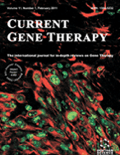
CURRENT GENE THERAPY
Scope & Guideline
Bridging Research and Clinical Practice.
Introduction
Aims and Scopes
- Gene Therapy Innovations:
The journal highlights breakthroughs in gene therapy methodologies, exploring both established and novel techniques for delivering therapeutic genes to target cells. - Cancer Research and Treatment:
A significant focus is placed on the application of gene therapy in oncology, investigating therapeutic strategies for various cancers, including personalized medicine approaches. - Neurodegenerative Disorders:
CURRENT GENE THERAPY features research on gene therapy applications aimed at treating neurodegenerative diseases, emphasizing advancements in targeting and delivery systems. - Regulatory and Ethical Considerations:
The journal discusses the regulatory landscape surrounding gene therapy, including safety assessments, clinical trial designs, and ethical implications of genetic modifications. - Research on Non-Coding RNAs:
There is a consistent focus on the role of non-coding RNAs in gene regulation and their potential as therapeutic targets in various diseases.
Trending and Emerging
- CRISPR and Genome Editing Technologies:
Research on CRISPR-based gene editing continues to rise, focusing on its applications in therapeutic contexts, including cancer and genetic disorders, showcasing its potential for precision medicine. - Theranostics in Cancer Treatment:
The integration of diagnostic and therapeutic approaches, particularly concerning the use of biomarkers in conjunction with gene therapy, is an emerging trend that enhances personalized treatment strategies. - Non-Coding RNA Therapeutics:
There is a growing interest in the therapeutic potential of non-coding RNAs, with research focusing on their role in gene regulation and their applications in treating various diseases. - Nanoparticle and Vector Development:
Innovations in nanoparticle and viral vector technologies for gene delivery are increasingly prominent, as researchers seek to improve targeted delivery and reduce immunogenicity. - Immunotherapy and Gene Therapy Synergy:
The combination of gene therapy with immunotherapeutic strategies is gaining attention as a promising avenue for enhancing treatment efficacy in cancer and other diseases.
Declining or Waning
- Traditional Small Molecule Therapies:
Research on traditional pharmacological approaches has diminished as the field increasingly emphasizes genetic and molecular therapies, reflecting a shift towards more innovative genetic solutions. - General Stem Cell Therapies:
The focus on broad stem cell applications is waning in favor of targeted gene therapies, particularly those that utilize stem cells specifically for gene delivery or modification. - Basic Mechanistic Studies:
There is a noted decline in publications centered solely on basic mechanistic studies without a direct therapeutic application, as the journal increasingly prioritizes translational research.
Similar Journals

MOLECULAR MEDICINE
Catalyzing Collaboration in Molecular ResearchMOLECULAR MEDICINE, published by SPRINGER, is a leading scholarly journal dedicated to advancing the fields of genetics and molecular biology with a focus on clinical applications. Since its inception in 1994, it has evolved to become a pivotal platform for disseminating innovative research findings, achieving a remarkable Q1 ranking in multiple categories, including Genetics, Molecular Biology, and Molecular Medicine as of 2023. Featuring an Open Access model since 2000, the journal ensures that cutting-edge research is freely available to the global scientific community, facilitating collaboration and knowledge exchange. With a commitment to high-quality peer-reviewed content, MOLECULAR MEDICINE serves as an essential resource for researchers, healthcare professionals, and students seeking to stay at the forefront of molecular research and its implications for medical science. For those interested in contributing to or accessing vital research in this dynamic field, MOLECULAR MEDICINE stands out as a premier choice.

EXPERT REVIEWS IN MOLECULAR MEDICINE
Elevating Understanding of Health and DiseaseEXPERT REVIEWS IN MOLECULAR MEDICINE, published by Cambridge University Press, stands at the forefront of research in the fields of Molecular Biology and Molecular Medicine. With an impressive impact factor reflecting its Q1 status in both relevant categories, this journal serves as an essential platform for disseminating cutting-edge reviews and critical assessments that are vital for advancing our understanding of molecular mechanisms in health and disease. Established in 1997 and continuously evolving until 2024, it features contributions from leading experts that highlight emerging trends and innovative methodologies. Researchers, professionals, and students are encouraged to engage with the content, benefiting from the journal’s rigorous peer-review process and its commitment to academic excellence, making it a valuable resource within the scientific community.

JOURNAL OF MOLECULAR MEDICINE-JMM
Unveiling the Molecular Mysteries of Health and Disease.JOURNAL OF MOLECULAR MEDICINE (JMM) is a premier publication dedicated to advancing the field of molecular medicine, encompassing critical areas such as drug discovery, genetics, and biochemistry. Published by Springer Heidelberg in Germany, this influential journal has established its significance within the academic community, achieving an impressive Q1 ranking across multiple categories as of 2023, including Drug Discovery, Clinical Genetics, and Molecular Medicine. With a focus on publishing high-quality research and novel insights, JMM appeals to a diverse audience of researchers, professionals, and students passionate about the molecular underpinnings of health and disease. The journal, which has seen a convergence of relevant research spanning from 1976 to 2024, is instrumental in showcasing groundbreaking studies that push the boundaries of knowledge in molecular therapeutics and biomedical science. While it does not offer open access, the rigor of its peer-reviewed content ensures that each publication is a valuable addition to the scientific discourse surrounding molecular medicine. For comprehensive studies and reviews that highlight the intersection of molecular biology and clinical application, look no further than JOURNAL OF MOLECULAR MEDICINE.
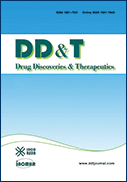
Drug Discoveries and Therapeutics
Unveiling the future of drug development and therapy.Drug Discoveries and Therapeutics is a highly regarded journal devoted to the advancement of knowledge in the field of medicine and pharmacology. Published by the International Research & Cooperation Association for Biological & Socio-Sciences Advancement in Tokyo, Japan, this journal serves as a vital resource for researchers, practitioners, and students interested in the latest developments in drug discovery and therapeutic strategies. With a Scopus ranking of #192 out of 826 in the General Medicine category, and positioning itself in the 76th percentile, it demonstrates a significant impact within the scientific community. The journal publishes original research articles, reviews, and innovative studies that address the complexities of drug development, therapeutic efficacy, and clinical applications. Researchers and clinicians can access valuable insights to enhance their practices and inform further studies as it continues to disseminate crucial findings essential for the advancement of medical science.

CANCER GENE THERAPY
Driving Progress in Molecular Biology for Cancer SolutionsCancer Gene Therapy, published by SpringerNature, stands at the forefront of research in the fields of cancer research, molecular biology, and molecular medicine. With a robust impact factor reflecting its significant influence—ranking in the Q2 category for cancer research and Q1 for both molecular biology and molecular medicine—it serves as an essential resource for scholars and practitioners alike. Since its inception in 1994, the journal has dedicated itself to advancing the understanding and therapeutic application of genetic innovations in oncology. Notably, it holds distinguished Scopus ranks, placing it among the top tier journals in its categories, underscoring its importance to the scientific community. While open access options are not available, the compelling research published here offers invaluable insights into the latest advancements and strategies in cancer therapy. Engaging with *Cancer Gene Therapy* not only keeps professionals informed but also inspires future innovations in the quest for effective cancer treatments.

INTERNATIONAL JOURNAL OF HUMAN GENETICS
Empowering Scholars in the Field of GeneticsINTERNATIONAL JOURNAL OF HUMAN GENETICS is a distinguished publication dedicated to advancing knowledge in the fields of genetics and molecular biology. Published by KAMLA-RAJ ENTERPRISES, this journal explores critical developments and research findings from 2008 to 2016, though its coverage in Scopus has since been discontinued. With an ISSN of 0972-3757 and an E-ISSN of 2456-6330, the journal aimed to foster scholarly dialogue and serve as a resource for researchers, professionals, and students engaged in human genetics. While the journal holds a modest ranking in categories such as Biochemistry and Genetics, it remains a vital source for exploring niche topics within the realm of human genetics. Researchers interested in genetic screening, gene therapy, and clinical genetics will find valuable insights herein. Despite its pause in indexing, the journal continues to contribute to the academic discourse by disseminating critical research that bridges gaps in understanding human genetics.
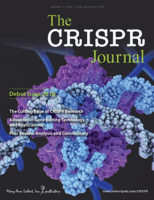
CRISPR Journal
Empowering Scientists with Cutting-Edge DiscoveriesThe CRISPR Journal, published by MARY ANN LIEBERT, INC, is a pioneering platform dedicated to advancing the field of genetics and biotechnology through innovative research focused on CRISPR technology and its diverse applications. With an impressive Q1 ranking in both Biotechnology and Genetics for 2023, this journal is positioned among the leading publications in its field, showcasing groundbreaking studies from 2019 to 2024. While currently utilizing a subscription model, the journal's commitment to open science is reflected in its efforts to make high-quality research accessible to researchers, professionals, and students. The CRISPR Journal facilitates the dissemination of knowledge related to genomic editing technologies, fostering collaboration and advancing the understanding of gene manipulation, therapeutic techniques, and agricultural innovations. As a valuable resource for cutting-edge developments in the biochemistry and genetics landscape, this journal is essential for those seeking to stay at the forefront of CRISPR research and applications.

JOURNAL OF GENE MEDICINE
Elevating Standards in Gene Medicine ResearchThe Journal of Gene Medicine, published by Wiley, stands as a pivotal resource in the field of gene therapy and molecular medicine, with a rich history of dissemination of impactful research since its inception in 1998. With an ISSN of 1099-498X and an E-ISSN of 1521-2254, this esteemed journal plays a crucial role in advancing our understanding of genetics and drug discovery, reflected in its impressive 2023 Scopus rankings where it holds a Q2 classification in Drug Discovery and Q3 in several genetics-related categories. The journal aims to facilitate the exchange of high-quality research findings that bridge the gap between laboratory and clinical applications, making it an essential platform for researchers, academics, and healthcare professionals committed to the forefront of genetic innovation. Although it does not currently offer open access options, its reputation for rigorous peer review ensures that all published work meets the highest academic standards, providing a reliable reference for scientific inquiry in the United States and beyond. As the field rapidly evolves, the Journal of Gene Medicine remains at the helm, guiding future discoveries with its influential publications and comprehensive insights.
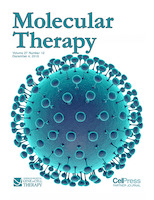
MOLECULAR THERAPY
Pioneering innovative therapies through molecular insights.MOLECULAR THERAPY, published by CELL PRESS, is a distinguished journal in the field of molecular biology and therapy, renowned for its significant contributions to drug discovery, genetics, and pharmacology since its inception in 2000. This prestigious journal, which holds a commendable position in the Q1 category across multiple disciplines including Drug Discovery, Molecular Medicine, and Molecular Biology, facilitates cutting-edge research and innovative therapies that aim to improve patient outcomes. With an impressive Scopus ranking that places it among the top journals in its field—such as rank #6 in Drug Discovery and #8 in Pharmacology—MOLECULAR THERAPY is crucial for researchers, professionals, and students seeking to advance their understanding and application of molecular techniques. The journal welcomes high-quality submissions that explore the therapeutic potential of molecular mechanisms, fostering a collaborative spirit within the scientific community to push the boundaries of modern medicine.
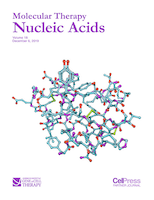
Molecular Therapy Nucleic Acids
Unlocking the potential of molecular medicine through nucleic acids.Molecular Therapy Nucleic Acids is a premier open-access journal published by CELL PRESS, dedicated to advancing the field of molecular medicine through the innovative application of nucleic acid-based therapies. Since its inception in 2012, this journal has become an essential resource for researchers and professionals in drug discovery and molecular medicine, reflected in its status as a Q1 journal in both categories for 2023. With a notable impact factor and high rankings in Scopus, including #8 out of 157 in Drug Discovery and #16 out of 178 in Molecular Medicine, it serves to disseminate groundbreaking research and foster collaborations among scientists worldwide. The journal's comprehensive scope encompasses a wide variety of topics, including gene therapy, RNA interference, and CRISPR technology, ensuring that it remains at the forefront of scientific excellence. With open access availability, Molecular Therapy Nucleic Acids actively promotes the widespread dissemination of knowledge, making its crucial insights accessible to students, researchers, and industry professionals alike.